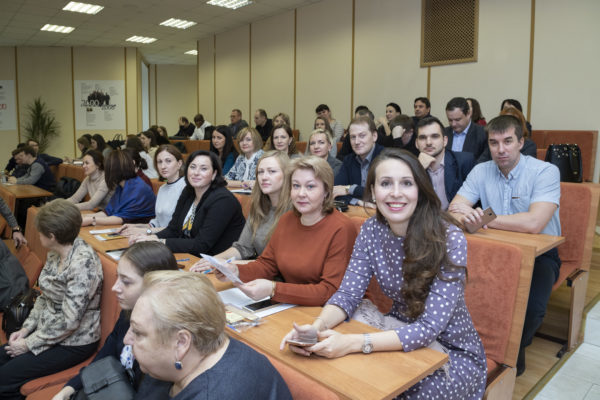
‘State, Power, Governance and Law’ conference
The State University of Management has brought together researchers, teachers, post-graduates and students from leading universities of Moscow and the regions for the 10th All-Russian Scientific and Practical Conference ‘State, Power, Governance and Law’. The anniversary conference was organised by the Public Administration and Political Technologies Department of the Institute of State Management and Law.
In her welcoming speech on behalf of the Rector of the State University of Management Ivan Lobanov, Kseniya Yekimova, Doctor of Economics, Professor, SUM Vice Rector for Research, emphasised the utmost importance and demand for modern political and legal science and the practice of holding such scientific conferences. She highlighted the important role that SUM plays in the development of Russian management science, including modern state management science.
This conference is one of the most effective and meaningful. The practical format allows us to discuss the actual issues that we face universally. State management and public policy are a set of competencies that we offer our students today, a set of competencies that underlies the strategic development of our university, the research development programme and the Ministry of Science and Higher Education of Russia as a whole,
said Professor Kseniya Yekimova.
Professor Fyodor Myshko, Director of the Institute of State Management and Law, Chairman of the Organising Committee of the Conference; Professor Gennadiy Latfullin, Deputy Chairman of the Organising Committee of the Conference; and Professor Nikolay Omelchenko, Scientific Director of the Conference, Head of the State Management and Political Technologies Department, greeted the participants of the Conference who gathered at the State University of Management to discuss the pressing issues of modern national and international public policy, power, administration and law. The speakers drew attention to the importance traditionally placed by the management of the Institute of State Management and Law on the research activities of the Institute’s teachers of post-graduate, undergraduate and graduate students.
The plenary session featured presentations by renowned academics and practitioners in the area of state-building and governance. The following presentations attracted particular scientific and practical interest: ‘Current Trends in the Industrial Policy of the Russian Federation’ by Aleksey Uchenov, Director of the Strategic Development and Corporate Policy Department of the Ministry of Industry and Trade of the Russian Federation; ‘The Impact of Digital Technology on the Labour Market’ by Aleksandr Grebenyuk, Doctor of Economics, Deputy Director for Research at the Higher School of Science, Lomonosov Moscow State University; ‘Several Aspects of the Study of Russian National (Political) Identity Issues’ by Nikolay Omelchenko, Professor, Head of the State Management and Political Technologies Department; ‘Urban Management of Renovation Processes in Housing’ by Ariadna Kirillova, Professor at the Department of Construction Organisation and Real Estate Management of the National Research Moscow State University of Civil Engineering.
Scientific discussions were held in the following sections of the Conference: ‘State Management and Public Policy in Contemporary Environment’ (moderated by Nikolay Omelchenko, Professor, Head of the State Management and Political Technologies Department) and ‘State Migration Policy and Management of Migration Processes: Domestic and International Experience’ (moderated by Vladimir Volokh, Professor of the State Management and Political Technologies Department, and Vera Suvorova, Associate Professor of the Department). Together with speeches by renowned researchers on the discussed issues, presentations by young researches and students also aroused great interest: ‘Therapeutic State as an Instrument of Identity Consolidation’ (Artemiy Atamanenko), ‘Social Lobbying as an Instrument of Interaction between Society and State in the Area of Education’ (Viktoriya Isayenko), ‘Introduction of Project Management Methods into State Control Bodies’ (Tatyana Yeremina and Veronika Makarova), ‘Relationship between Clientelism and Lobbyism in Functional Representation of Interests’ (Daniil Romanenko), ‘Mediocracy as a Subject of Information Wars in the Current Political Environment’ (Anastasiya Timofeyeva), ‘Some Migration Processes of the Transitional Period in the Republic of Crimea’ (Yelena Tsoy), ‘Major Issues and Prospects of D. Trump’s Migration Policy’ (Yekaterina Shevchenko) and others.
The science of governance is undergoing a crisis today, new methodological foundations are emerging. In my opinion, digitalisation of the economy and governance can be a double-edged sword. Technology has a technological edge and an anthropological, spiritual edge. In other words, the major trend in governance is to manage uncertainty, and today we are already implementing and addressing these issues, the issues of anthropology. These are entirely new methodological approaches to governance,
said Gennadiy Latfullin, Professor, Deputy Chairman of the Conference Organising Committee.
The ‘Topical Issues of Regional and Municipal Governance’ section (moderated by Rifat Sirazhdinov, Associate Professor of the State and Municipal Governance Department, and Nina Musinova, Associate Professor of the State and Municipal Governance Department of the Financial University under the Government of the Russian Federation) also featured many informative presentations. This section had the largest number of participants. It was attended by both representatives of the university’s research institutes and employees of the state and municipal bodies. The section participants discussed a wide range of pressing issues regarding the state and municipal governance.
The pressing issues of contemporary legal science and practice in the area of state administration were discussed within the ‘Legal Support of Management’ section (moderated by Irina Strelnikova, Associate Professor of the Private Law Department).
The conference also featured round tables: ‘Scientific Potential of Universities as an Object of Public Policy’ (moderated by Dmitriy Znamenskiy, Associate Professor of the State Management and Political Technologies Department) and ‘Digital Competences of Modern Civil Servants’ (moderated by Dmitriy Filimonov, Associate Professor of the State Management and Political Technologies Department, and Nikolay Sokolov, Associate Professor of the Department).
Together with speeches by renowned researchers on the discussed issues, presentations by young researches and students also aroused great interest. The event’s participants summarised the results of scientific research and experience of leading scientists of Russian universities. The participants noted that meetings at this level provide the opportunity to strengthen business relations between universities as well as to outline the prospects for future research.
To view the photo report of the 10th All-Russian Scientific and Practical Conference ‘State, Power, Governance and Law’, please click here.
Подпишись на тг-канал "Наш ГУУ" Дата публикации: 3.12.2019
Дата публикации: 3.12.2019





